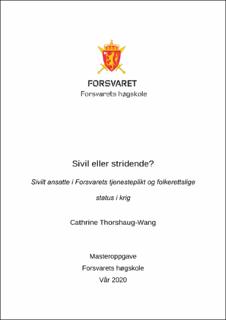| dc.contributor.author | Thorshaug-Wang, Cathrine | |
| dc.date.accessioned | 2020-10-19T08:57:13Z | |
| dc.date.available | 2020-10-19T08:57:13Z | |
| dc.date.issued | 2020 | |
| dc.identifier.uri | https://hdl.handle.net/11250/2683553 | |
| dc.description.abstract | Temaet for denne studien er sivilt ansatte i Forsvarets tjenesteplikt og folkerettslige status i krig. Oppgaven avgrenser seg til internasjonale væpnede konflikter (IVK), og styrkeoppbygging med hjemmel i nasjonal suverenitetshevdelse ved krig i Norge. Oppgaven søker å avklare hva internasjonal humanitærrett (IHR) sier om hva som avgjør personellets status. I tillegg søker oppgaven å avklare hvilke bestemmelser som er gitt i nasjonale rettskilder, samt offentlige og forsvarsinterne dokumenter, for å se om disse er i henhold til de traktater og avtaler Norge har forpliktet seg til å følge. Videre analyseres nasjonale rettskilder, for å avklare hvorvidt sivilt ansatte i Forsvaret har plikt til å møte på jobb ved styrkeoppbygging og i krig.
I en lang periode har Norge, på lik linje med andre NATO-land, gått fra kald krig-fokus til et out-of-area fokus. Dette har medført at for mange ansatte i Forsvaret i dag, er operasjoner i ikke-internasjonale væpnede konflikter geografisk langt fra Norge det eneste operasjonskonseptet man kjenner. Når alliansen etter 2014 har dreiet fokus tilbake til core-area og nasjonal beredskap, oppleves det å være stor usikkerhet i Forsvaret rundt de sivilt ansattes plikter og folkerettslige status dersom krigen kommer til Norge. Forsvaret er i dag, av flere årsaker, avhengig av at de som jobber i Forsvaret til daglig også er tilgjenglige i krig. Temaet har derfor stor operativ aktualitet.
Analysen av internasjonale traktater, forarbeider til disse og juridisk litteratur, viser at det er personellets tilknytning til de væpnede styrker som bestemmer personellets primærstatus. Det innebærer at sivilt ansatte i det norske forsvaret er å anse som stridende i henhold til IHR, uavhenig av hvilke oppgaver personellet utfører. IHR anerkjenner samtidig at de væpnede styrker består av mange ulike avdelinger og oppgaver, og åpner derfor for at noen medlemmer kan gis nasjonal status som ikke-stridende. Dette endrer ikke deres primærstatus som stridende i henhold til krigens folkerett.
Når det gjelder tjenesteplikten, viser analysen av nasjonale rettskilder at de sivilt ansatte i Forsvarets tjenesteplikt i krig er uklar. I tillegg viser analysen at hverken gjeldende arbeidsavtale eller en eventuell arbeidsplikt gjennom beredskapslovgivningen, er tilstrekkelig for å pålegge personellet den tjenesteplikten Forsvaret er avhengig av for å opprettholde stridsevne i krig. | en_US |
| dc.description.abstract | The subject of this thesis is the primary status of civilian employees of the Norwegian Armed Forces according to International Humanitarian Law, during International Armed Conflicts (IAC). It also aims to reveal if, or to which extent, civilian employees of the Norwegian Amed Forces are obliged to serve if the country is at war.
Modern armed forces consist of both military- and civilian employees. Because of high readyness and modern technology, the forces are dependent upon that all peacetime-employees are obliged to serve if the country should find itself at war.
After many years with an out-of-area focus, the NATO-alliance has now returned to an increased focus on national prepearedness. The fact that most employees of the Armed Forces today have served only after the Cold War, and in non-international armed conflicts abroad, this return to core-area-operations has led to a lack of knowledge concerning management of civilian employees in international armed conflicts.
The study analyses International Humanitarian Law (IHL), Norwegian national legislation, national official documents, and internal documents and manuals of the Norwegian Armed Forces to clarify the personnel’s status and their obligations to serve. The thesis also aims to clarify whether or not Norwegian laws and regulations, official documents and military manuals are consistent with the treaties and conventions Norway has comitted itself to.
An analysis of IHL shows that it is a persons membership to the nations armed forces that decides his or her primary status in IAC, regardless of the tasks the person is given. This means that the civilian employees of the Norwegian armed forces are combatants if Norway is at war. IHL recognises the fact that the forces consists of both fighting and non-fighting personnel. For that reason, every country is able to give some of the members of the armed forces a national status of non-combatant. This national status does not however, change their international status of combatant according to IHL.
With regards to the personnel’s obligation to serve, the analysis of national legislation shows that civilian employees duty to serve in times of war is unclear. The analysis also shows that the current employment contract given to civilian employees of the Armed Forces is insufficient in order to impose the duty of service the defense relies on to maintain operational capable at war. | en_US |
| dc.language.iso | nob | en_US |
| dc.publisher | Forsvarets høgskole | en_US |
| dc.title | Sivil eller stridende? Sivilt ansatte i Forsvarets tjenesteplikt og folkerettslige status i krig | en_US |
| dc.type | Master thesis | en_US |
| dc.rights.holder | Cathrine Thorshaug-Wang | en_US |
